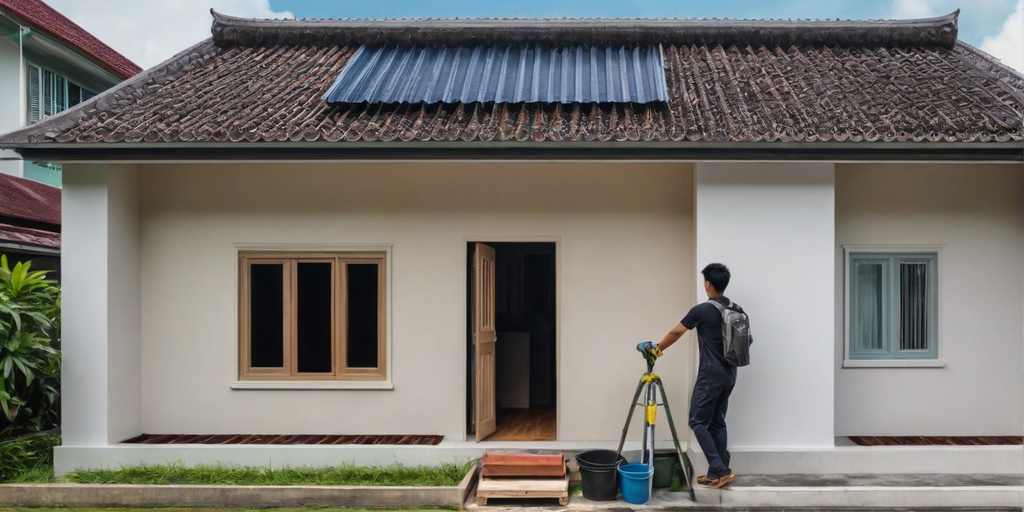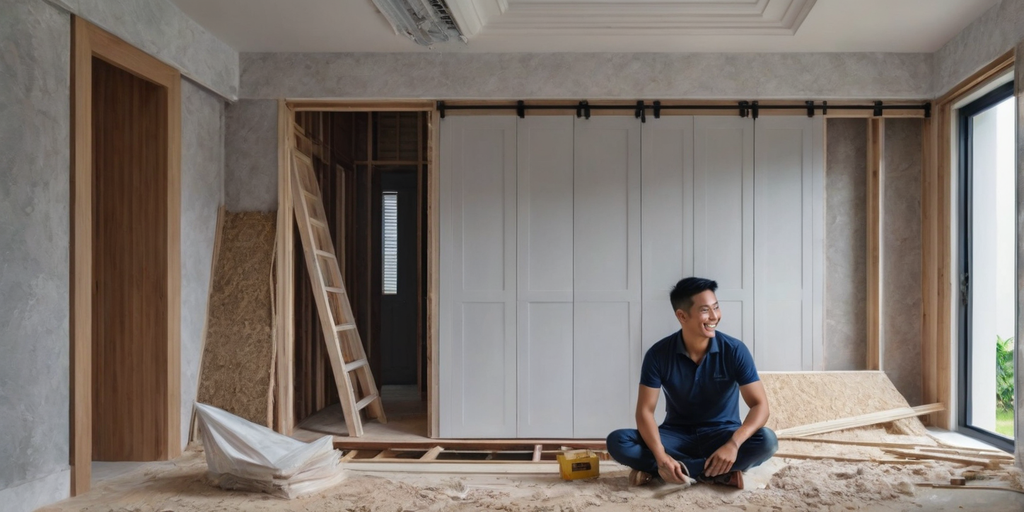Are you planning to renovate your home in Singapore but don’t have enough funds? You’re not alone. Home renovation can be expensive, and many homeowners struggle with financing options. Fortunately, there are different types of loans available in Singapore to help you achieve your dream home renovation. But which one should you get, a renovation or personal loan?

Renovation loans and personal loans are both viable options for financing home renovations in Singapore. However, they have different features and requirements that you should consider before making a decision. Renovation loans are specifically designed for home improvement projects, while personal loans are more flexible in terms of usage. In this article, we will explore the differences between renovation and personal loans, how to apply for a loan in Singapore, budgeting for your home renovation, and other financing options and considerations.
Key Takeaways
- Renovation loans and personal loans are both financing options for home renovations in Singapore, but they have different features and requirements.
- Renovation loans are specifically designed for home improvement projects, while personal loans are more flexible in terms of usage.
- Before applying for a loan, it’s important to budget for your home renovation and consider other financing options and considerations.
Renovation or Personal Loan in Singapore: Understanding Renovation Loans in Singapore

If you’re planning to renovate your home in Singapore, you may be considering taking out a renovation loan. Here’s what you need to know about renovation loans in Singapore.
What Is a Renovation Loan?
A renovation loan is a type of personal loan that is specifically designed to finance home renovation work. It is offered by financial institutions such as banks and is available to both HDB and private property owners in Singapore.
Benefits of Renovation Loans
Renovation loans offer several benefits to borrowers. Firstly, they allow you to borrow a larger sum of money than a personal loan, up to S$30,000. This can be especially useful if you’re planning a major renovation project.
Secondly, renovation loans typically have lower interest rates than personal loans. This means that you’ll pay less interest over the loan term, making it a more affordable option.
Typical Renovation Loan Requirements
To apply for a renovation loan, you’ll need to meet certain requirements. These requirements may vary depending on the financial institution you’re applying to, but typically include:
- Proof of income: You’ll need to provide proof of your income, such as your latest payslip or income tax statement.
- Identification documents: You’ll need to provide your NRIC or passport.
- Quotation for renovation work: You’ll need to provide a quotation from a contractor for the renovation work you plan to undertake.
- Other documents: You may also need to provide other documents such as bank statements or proof of address.
In conclusion, renovation loans can be a great financing option if you’re planning to renovate your home in Singapore. They offer several benefits over personal loans, including larger loan amounts and lower interest rates. To apply for a renovation loan, you’ll need to meet certain requirements, including providing proof of income, identification documents, and a quotation for the renovation work.
Renovation or Personal Loan in Singapore: Exploring Personal Loans for Home Renovations

If you’re considering a personal loan to finance your home renovation project in Singapore, you’re in good company. Many borrowers find personal loans to be a flexible and convenient financing option that can help them achieve their renovation goals without breaking the bank.
What Is a Personal Loan?
A personal loan is an unsecured loan that you can use for any purpose, including home renovations. Unlike a renovation loan, which is specifically designed for renovations, a personal loan gives you the flexibility to use the funds as you see fit. This means you can use the loan to pay for materials, labour costs, or any other expenses related to your renovation project.
Advantages of Personal Loans for Renovations
One of the main advantages of a personal loan for home renovations is that it’s a flexible financing option. Unlike a renovation loan, which may have restrictions on how you can use the funds, a personal loan gives you complete control over your renovation project.
Another advantage of personal loans is that they may have lower interest rates than credit cards or other types of loans. This can help you save money on interest charges over the life of the loan.
Understanding Interest Rates and Fees
When you apply for a personal loan for home renovations in Singapore, you’ll want to pay close attention to the interest rates and fees associated with the loan. Interest rates can vary depending on the lender, your credit score, and other factors.
In addition to interest rates, you’ll also want to consider any fees associated with the loan, such as origination fees or prepayment penalties. These fees can add up over time, so it’s important to factor them into your overall cost when comparing loan options.
Overall, a personal loan can be a great financing option for home renovations in Singapore. With flexible terms, competitive interest rates, and a wide range of loan amounts available, personal loans can help you achieve your renovation goals without breaking the bank.
Renovation or Personal Loan in Singapore: The Comparison

If you’re planning to renovate your home, you may be wondering whether you should take out a renovation loan or a personal loan. Here, we’ll compare the two options to help you decide which one is right for you.
Interest Rates and Loan Tenure
One of the main differences between renovation loans and personal loans is the interest rates and loan tenure. Renovation loans typically have lower interest rates than personal loans, and longer loan tenures. This means that you’ll pay less in interest over the course of the loan, but you’ll have to make repayments for a longer period of time.
Loan Quantum and Disbursement
Another difference between renovation loans and personal loans is the loan quantum and disbursement. Renovation loans usually have higher loan quantum than personal loans, which means that you can borrow more money to finance your home renovation project. Additionally, renovation loans are usually disbursed in stages, which means that the lender will release the funds to you in instalments as the renovation work progresses. Personal loans, on the other hand, are usually disbursed in a lump sum.
Eligibility and Approval Process
When it comes to eligibility and approval process, renovation loans and personal loans are quite different. Renovation loans are specifically designed for home renovation projects, which means that you’ll need to provide additional documentation such as renovation quotation and proof of ownership. Personal loans, on the other hand, are more flexible and can be used for a wide range of purposes. Additionally, the application process for personal loans is usually simpler and faster than renovation loans.
In Singapore, both renovation loans and personal loans are popular financing options for home renovation projects. Ultimately, the choice between the two will depend on your individual needs and circumstances. If you need a higher loan quantum and don’t mind a longer loan tenure, a renovation loan may be the better option. However, if you prefer a simpler and faster application process, and don’t need to borrow as much money, a personal loan may be the way to go.
Renovation or Personal Loan in Singapore: How to Apply

If you have decided to take out a loan to finance your home renovation, you must know the process of applying for a loan in Singapore. Here’s what you need to know.
The Application Process
The first step in getting a loan is to choose a lender and fill out an application. You can apply for a loan online or in person at a bank, credit union, or licensed moneylender. Most lenders require you to provide information about your income, employment, and credit history.
Before applying, make sure you have researched and compared different loan providers and their interest rates, fees, and repayment terms. This will help you find the best loan offer that suits your needs and budget.
Documentation and Approval
Once you have submitted your loan application, the lender will review your documents and credit history to determine your eligibility. The lender may ask for additional documentation, such as proof of income, bank statements, or identity verification.
If your application is approved, the lender will provide you with a loan offer that includes the loan amount, interest rate, repayment period, and any fees or charges. Make sure you read and understand the loan terms before accepting the offer.
Receiving Your Funds
After you have accepted the loan offer, the lender will disburse the funds to you. Depending on the lender, you may receive the funds via cheque, bank transfer, or cash.
Make sure you use the funds for your renovation expenses only and keep track of your repayment schedule. Failure to repay the loan on time may result in additional fees or legal action by the lender.
Overall, applying for a loan in Singapore is a straightforward process if you have the necessary documentation and meet the lender’s eligibility criteria. By choosing the right loan provider and understanding the loan terms, you can finance your home renovation and achieve your dream home.
Renovation or Personal Loan in Singapore: Budgeting for Your Dream Home Renovation

Excited to finally start renovating your dream home? Before you get started, it’s important to create a budget to ensure that you don’t overspend and end up with a financial burden. Here are some tips to help you create a realistic budget for your home renovation:
Creating a Renovation Budget
The first step in creating a renovation budget is to determine how much you can afford to spend. Take a look at your cash flow and expenses to determine how much you can realistically allocate towards your renovation. Once you have a budget in mind, make a list of all the renovation costs you’ll need to cover, such as labour, materials, and permits.
To help you stay on track, consider using a spreadsheet or budgeting tool to track your expenses and ensure that you’re staying within your budget. Be sure to also factor in a contingency fund to cover any unexpected costs that may arise during the renovation process.
Incorporating Furniture and Appliances
When budgeting for your home renovation, don’t forget to factor in the cost of furniture and appliances. If you’re planning on purchasing new furniture or appliances, be sure to include these costs in your budget. You may also want to consider purchasing second-hand or refurbished items to save money.
Managing Cash Flow During Renovations
Renovating your home can be a costly process, so it’s important to manage your cash flow to ensure that you have enough funds to cover your expenses. Consider breaking up your renovation into smaller projects to spread out the costs over a longer period of time. You may also want to consider financing options, such as renovation loans or personal loans, to help cover your expenses.
When it comes to financing your home renovation, it’s important to consider all of your options to determine which one is right for you. Keep in mind that renovation loans are specifically designed for home renovations, while personal loans can be used for a variety of purposes. Be sure to compare interest rates, fees, and repayment terms to find the best financing option for your needs.
By following these tips, you can create a realistic budget for your home renovation and manage your cash flow to ensure that you don’t overspend. With careful planning and budgeting, you can turn your dream home into a reality.
Renovation or Personal Loan in Singapore: Additional Financing Options and Considerations

Aside from renovation and personal loans, there are other financing options that you can consider when funding your home renovation project in Singapore. Here are some of them:
Credit Cards and Overdrafts
Credit cards and overdrafts are short-term financing options that you can use to pay for your home renovation expenses. However, they usually come with high interest rates and fees, so you should only use them if you can repay the amount borrowed within a short period.
Using Savings and Investments
If you have savings or investments, you can use them to fund your home renovation project. This option is ideal if you have enough funds to cover the entire project cost without borrowing money. However, you should still consider the opportunity cost of using your savings or investments, as they may earn higher returns if left untouched.
Alternative Loan Providers
Aside from banks and financial institutions, there are also licensed moneylenders that offer renovation loans and personal loans in Singapore. These lenders may have more relaxed eligibility criteria and faster processing times than traditional lenders, but they usually charge higher interest rates and fees. Make sure to compare the terms and conditions of different loan providers before borrowing money.
When choosing a financing option for your home renovation project, it’s important to consider your financial situation, the amount you need to borrow, the interest rates and fees, and the repayment terms. By doing your research and comparing different options, you can find the best financing option that suits your needs and budget.
Renovation Planning and Contractor Selection

Are you planning to renovate your home in Singapore? Renovating your home can be an exciting experience, but it can also be stressful if you don’t plan it properly. One of the most important things to consider when planning a renovation project is selecting the right contractor. In this section, we will discuss how to choose the right contractor, interior design and planning, and handling electrical and plumbing work.
Choosing the Right Contractor
Choosing the right contractor is crucial to the success of your renovation project. You should look for a contractor with experience in similar projects and a good reputation in the industry. You can check their portfolio and read reviews from previous clients to get an idea of their work quality.
It is also important to check if the contractor is licensed and insured. In Singapore, contractors must be registered with the Building and Construction Authority (BCA) and have a valid license to carry out renovation work. You can check the BCA website to verify their license and ensure that they have the necessary insurance coverage.
Interior Design and Planning
Interior design and planning are important aspects of any renovation project. You should have a clear idea of what you want to achieve with your renovation and work with an interior designer to create a plan that meets your needs and budget.
You can also consider using software or online tools to create a 3D model of your space and experiment with different design ideas. This can help you visualise the end result and make any necessary changes before the renovation work begins.
Handling Electrical and Plumbing Work
Electrical and plumbing work are critical components of any renovation project. You should ensure that the contractor has experience and the necessary qualifications to handle these tasks safely and efficiently.
In Singapore, electrical work must be carried out by a licensed electrician, and plumbing work must be carried out by a licensed plumber. You can check the contractor’s qualifications and licenses to ensure that they are qualified to handle these tasks.
In conclusion, proper planning and contractor selection are essential to the success of your renovation project. By choosing the right contractor, working with an interior designer, and ensuring that electrical and plumbing work is carried out safely and efficiently, you can achieve your dream home improvement project in Singapore.
Frequently Asked Questions

What’s the maximum sum I can get my hands on for a spruce-up loan in Singapore?
The maximum amount you can borrow for a renovation loan in Singapore is typically capped at S$30,000. However, personal loans can offer a higher ceiling of up to S$200,000 and up to 8x your monthly income for those with annual incomes of S$120,000 or more. Keep in mind that the amount you can borrow depends on your credit score, income, and other factors.
Are you considering the pros and cons of a renovation loan?
Before taking out a renovation loan, it’s important to weigh the pros and cons. Renovation loans typically have lower interest rates compared to personal loans, making them a more cost-effective option. However, renovation loans are typically capped at a lower amount and may require collateral. Personal loans, on the other hand, offer more flexibility but may come with higher interest rates.
How can I finance my home makeover in Singapore most effectively?
The most effective way to finance your home makeover in Singapore depends on your financial situation and goals. Consider your credit score, income, and the amount you need to borrow. Renovation loans are a good option if you need to borrow a smaller amount at a lower interest rate, while personal loans are more flexible but may come with higher interest rates.
Which banks are in the game for providing top-notch renovation loans?
There are several banks in Singapore that offer renovation loans, including DBS, UOB, and OCBC. It’s important to compare the interest rates and terms of each loan before making a decision.
Have you tried using a renovation loan calculator to plan your budget?
Using a renovation loan calculator can help you plan your budget and determine how much you can afford to borrow. Many banks offer renovation loan calculators on their websites, or you can use an online calculator to get an estimate.
When is taking out a loan the smart move for funding home improvements?
Taking out a loan for home improvements can be a smart move if you have a solid plan for paying it back and the improvements will increase the value of your home. However, it’s important to avoid taking on too much debt and to make sure you can afford the monthly payments. Consider your budget and financial goals before taking out a loan.

